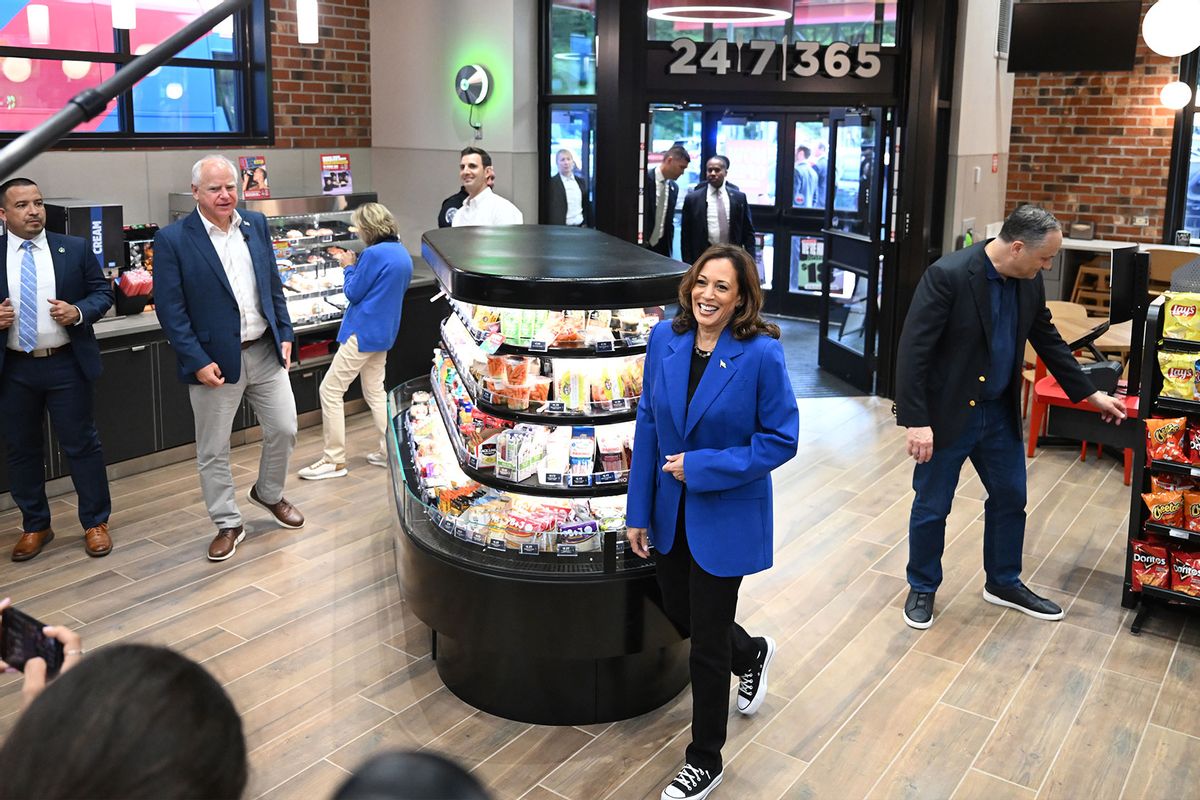Democratic presidential nominee Kamala Harris is planning to enact the first-ever federal law against corporate price gouging in the food and grocery industries, much to the frustration of some major corporations and food executives.
In a speech made last Friday, Harris promised to crack down on “excessive prices unrelated to the costs of doing business” by food suppliers and grocery stores, including those involved in big mergers and acquisitions. Harris noted that amid the rising cost of groceries — which have gone up by 25% between 2019 and 2023, faster than other consumer goods and services, according to the U.S. Department of Agriculture (USDA) — several food companies are raking in more profits. Foods like bread are now about 50% more expensive than before the COVID-19 pandemic, Harris said.
The current vice president specified that she is looking to target businesses that are illegally hiking up prices and not “playing by the rules.” Harris added that competition within the food industry is ultimately necessary to help bring down the high cost of food nationwide.
However, food companies begged to differ, arguing that price hikes are imperative due to high inflation which has caused the costs of labor and raw materials to increase greatly.
“We understand why there is this sticker shock and why it’s upsetting,” Andy Harig, vice president of Tax, Trade, Sustainability & Policy Development at the Food Industry Association (FMI), told the Wall Street Journal. “But to automatically just say there’s got to be something nefarious, I think to us that is oversimplified.”
In response to Harris’ plan, the National Grocers Association said, “The proposal calling for a ban on grocery price gouging is a solution in search of a problem,” adding that its members are also reeling from inflation in the same vein as consumers.
Harris’ focus on corporate price gouging comes a few months after President Joe Biden called out so-called “shrinkflation” — the phenomenon of items shrinking in size, quantity, or, even, quality while their prices remain the same — during his annual State of the Union address to Congress.
“Too many corporations raise prices to pad the profits, charging more and more for less and less,” the president said. Biden previously called out shrinkflation in anticipation of the Super Bowl and asked companies to “put a stop to this” in a game day commercial.
“Some companies are trying to pull a fast one by shrinking the products little by little and hoping you won't notice,” he said. “I'm calling on companies to put a stop to this.”
Despite his criticisms of high food prices, Biden failed to wield executive power to target food retailers and major corporations at the center of the issue, per the request of several progressives. Food prices have surged by more than 20% under the Biden-Harris administration, compelling Republicans to claim that “Bidenomics” has failed the American people.
Former president Donald Trump, at a rally in Pennsylvania, called out Harris’ recent proposal: “After causing catastrophic inflation, Comrade Kamala announced that she wants to institute socialist price controls.”
“Prices will come down,” Trump proclaimed to voters during a speech last week addressing his return to the White House. “You just watch: They’ll come down, and they’ll come down fast, not only with insurance, with everything.”
“Prices will come down and come down dramatically and come down fast,” he added, specifying that deflation — a term he refrained from using himself — would happen across the economy.
Such massive price drops would ultimately be more harmful than beneficial, many economists have decried. In conversation with CNN, Justin Wolfers, an economist at the University of Michigan, decribed Trump’s pledge as “unrealistic.”
Want more great food writing and recipes? Subscribe to Salon Food's newsletter, The Bite.
“The way to bring about deflation would be to create a massive recession. That would cause businesses to start cutting prices,” Wolfers said.
Economists have also criticized Harris’ plan, saying it could create more problems for consumers. Many even likened it to the wage and price controls imposed by Richard Nixon in the early 1970s.
“This is not sensible policy, and I think the biggest hope is that it ends up being a lot of rhetoric and no reality,” Jason Furman, a top economist in the Obama administration, told the New York Times. “There’s no upside here, and there is some downside.”
According to the United States Department of Agriculture, prices for all food are predicted to increase 2.2% in 2024. Food-at-home prices (defined as grocery store or supermarket food purchases) are expected to increase 1% while food-away-from-home prices (defined as restaurant purchases) are predicted to increase 4.3%.
In 2025, prices for all food are predicted to increase 2%, with food-at-home prices expected to increase 0.7% and food-away-from-home prices expected to increase 3%.



Shares